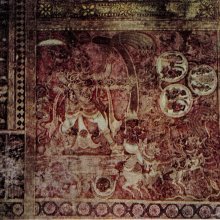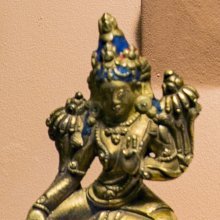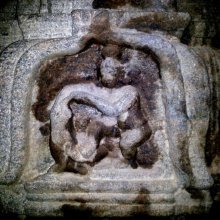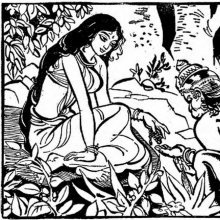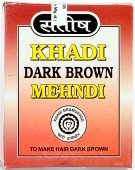Sho, Śo, Śō, Ṣō: 15 definitions
Introduction:
Sho means something in Hinduism, Sanskrit, the history of ancient India, Jainism, Prakrit, Hindi, biology, Tamil. If you want to know the exact meaning, history, etymology or English translation of this term then check out the descriptions on this page. Add your comment or reference to a book if you want to contribute to this summary article.
The Sanskrit terms Śo and Śō and Ṣō can be transliterated into English as So or Sho, using the IAST transliteration scheme (?).
Images (photo gallery)
(+112 more images available)
In Hinduism
Kavya (poetry)
Source: archive.org: Naisadhacarita of SriharsaSo (सो) means “to bring to an end” (to destroy), and is mentioned in the Naiṣadha-carita 9.140.

Kavya (काव्य, kavya) refers to Sanskrit poetry, a popular ancient Indian tradition of literature. There have been many Sanskrit poets over the ages, hailing from ancient India and beyond. This topic includes mahakavya, or ‘epic poetry’ and natya, or ‘dramatic poetry’.
India history and geography
Source: Cologne Digital Sanskrit Dictionaries: Indian Epigraphical GlossarySo.—(IE 8-1), abbreviation of Soma-vāra, Monday. Note: so is defined in the “Indian epigraphical glossary” as it can be found on ancient inscriptions commonly written in Sanskrit, Prakrit or Dravidian languages.
--- OR ---
Śŏ.—ṉa-vari (SITI), Tamil; same as pŏn-vari; explained as ‘tax payable in gold’; but may be professional tax payable by the goldsmiths; cf. suvarṇa-daṇḍa. Note: śŏ is defined in the “Indian epigraphical glossary” as it can be found on ancient inscriptions commonly written in Sanskrit, Prakrit or Dravidian languages.
--- OR ---
Śo.—ḻiya-kkāśu, ‘the Coḻa kāśu (copper coin)’; see kāśu. Note: śo is defined in the “Indian epigraphical glossary” as it can be found on ancient inscriptions commonly written in Sanskrit, Prakrit or Dravidian languages.

The history of India traces the identification of countries, villages, towns and other regions of India, as well as mythology, zoology, royal dynasties, rulers, tribes, local festivities and traditions and regional languages. Ancient India enjoyed religious freedom and encourages the path of Dharma, a concept common to Buddhism, Hinduism, and Jainism.
Biology (plants and animals)
Source: Google Books: CRC World Dictionary (Regional names)1) So in Burkina Faso is the name of a plant defined with Isoberlinia doka in various botanical sources. This page contains potential references in Ayurveda, modern medicine, and other folk traditions or local practices It has the synonym Berlinia grandiflora (Vahl) Hutch. & Dalziel (among others).
2) So in Gambia is also identified with Imperata cylindrica It has the synonym Calamagrostis lagurus (L.) Koeler (etc.).
3) So in Ghana is also identified with Sorghum bicolor It has the synonym Andropogon saccharatus (L.) Raspail, nom. illeg., non Andropogon saccharatus (L.) Roxb. (etc.).
Example references for further research on medicinal uses or toxicity (see latin names for full list):
· Observationes Botanicae (1789)
· Economic Botany (2004)
· Nomenclator Botanicus (1797)
· Methodus Plantas Horti Botanici … (1794)
· Flora Aegyptiaco-Arabica (1775)
· Plantae Junghuhnianae (1854)
If you are looking for specific details regarding So, for example health benefits, pregnancy safety, extract dosage, chemical composition, side effects, diet and recipes, have a look at these references.

This sections includes definitions from the five kingdoms of living things: Animals, Plants, Fungi, Protists and Monera. It will include both the official binomial nomenclature (scientific names usually in Latin) as well as regional spellings and variants.
Languages of India and abroad
Sanskrit dictionary
Source: DDSA: The practical Sanskrit-English dictionaryŚo (शो).—4 P. (śyati, śāta or śita, pass. śāyate; Caus. śāyayati; desid. śiśāsati)
1) To sharpen, whet.
2) To make thin, attenuate.
--- OR ---
So (सो).—4 P. (syati, sasau, asāt-asāsīt, sāsyati, sātum, sita; caus. sāyayati-te; desid. siṣāsati; pass. sīyate; the s of so is changed to ṣ after prepositions ending in i or u)
1) To kill, destroy.
2) To finish, complete, bring to an end; भ्रान्तिमसाद्दमस्वसुः (bhrāntimasāddamasvasuḥ) N.9.14.
Source: Cologne Digital Sanskrit Dictionaries: Edgerton Buddhist Hybrid Sanskrit DictionarySo (सो).—indecl. (= Pali sū; m.c. for su, q.v.) = Sanskrit svid: kiṃ so…Mahāvastu iii.370.1 (verse); same verse Pali Jātaka (Pali) v.141.10 kiṃ sū.
Source: Cologne Digital Sanskrit Dictionaries: Shabda-Sagara Sanskrit-English DictionaryŚo (शो).—r. 4th cl. (śyati) 1. To reduce or make small, to pare. 2. To whet or sharpen.
--- OR ---
Ṣo (षो).—r. 4th cl. (syati) 1. To destroy, to put an end to. 2. To be destroyed, to perish. 3. To finish. With ava, To fail. 2. To complete. With adhi and ava, 1. To practise. 2. To be able. 3. To determine. 4. To reflect. With pari and ava, 1. To endeavour. 2. To complete, to conclude. 3. To resolve. 4. To be lost. 5. To be reduced to. With vi and ava, 1. To determine upon, to accept. 2. To be convinced. 3. To endeavour, to strive. 4. To effectuate. 5. To desire. 6. To believe. With sam and vi, To decree.
--- OR ---
So (सो).—f.
(-soḥ) Parvati. E. ṣo to destroy aff. kvip .
Source: Cologne Digital Sanskrit Dictionaries: Benfey Sanskrit-English DictionaryŚo (शो).—† i. 4, śya (the original form was aś + ya; cf. [Latin] acies, acus, acer, acidus; [Gothic.] aqvizi; [Anglo-Saxon.] acas; Sskr. aśra, aśri, aśru, aśman, aśva, aṣṭra, etc.), [Parasmaipada.]; ved. ii. 3, śiśā, śiśī, [Parasmaipada.] [Ātmanepada.] To sharpen, [Lassen, Anthologia Sanskritica.] 98, 15 = [Rigveda.] v. 9, 5 (cf. śi). Ptcple. of the pf. pass. I. śāta. 1. Sharpened, sharp, [Rājataraṅgiṇī] 5, 407. 2. Handsome. 3. Happy. 4. Thin, [Raghuvaṃśa, (ed. Stenzler.)] 10, 70; feeble. n. Joy, happiness. Ii. śita. 1. Sharpened, sharp,
— With the prep. ā ā, ii. 3, To incite, [Lassen, Anthologia Sanskritica.] 101. 15 = [Rigveda.] vii. 16, 6.
— With ni ni, I. niśāta, Sharpened, sharp, [Bhāgavata-Purāṇa, (ed. Burnouf.)] 3, 19, 14; polished, burnished. Ii. niśita, Sharpened, sharp,
— With sam sam, saṃśita, 1. Certain, certified, established. 2. Completed, finished,
— Cf. also (see above), (i. e. ), (i. e. ), [Latin] aculeus, cātus (= śāta), tri-que + trus, cos, cautes, citus (= śita), probably ciere, cio, cieo (= śyāmi); [Gothic.] ahana, probably [Old High German.] hvezjan; [Anglo-Saxon.] hwettan (a [denominative.]); [Gothic.] hvôtjan.
--- OR ---
So (सो).—i. 4, sya (probably akin to 2. as, of which the base of the present is asya), [Parasmaipada.] To destroy. Ptcple. of the pf. pass. sita, Finished, completed, destroyed; see s. v.
— With the prep. ava ava, 1. To let fly, [Rigveda.] i. 104, 1. 2. To fail, [Kirātārjunīya] 16, 17. avasita, Completed, [Śākuntala, (ed. Böhtlingk.)] 3, 6; finished, [Vikramorvaśī, (ed. Bollensen.)] 37, 9. Comp. Dus-, adj. difficult to be comprehended, [Bhāgavata-Purāṇa, (ed. Burnouf.)] 6, 16, 47. [Causal.] sāyaya, To cause to be completed, [Raghuvaṃśa, (ed. Stenzler.)] 5, 76.
— With adhyava adhi-ava, 1. To practise, [Hitopadeśa] 42, 10, M.M. 2. To be able, [Śiśupālavadha] 9, 76. 3. To determine, Mahābhārata 3, 16254. 4. To reflect, [Śākuntala, (ed. Böhtlingk.)] [distich] 115, v. r.
— With paryava pari-ava, To endeavour, Naiṣ. 6, 23. paryavasita, 1. Finished, [Uttara Rāmacarita, 2. ed. Calc., 1862.] 29, 10. 2. Resolved, [Mālatīmādhava, (ed. Calc.)] 75, 3. 3. Perished, lost [Mālatīmādhava, (ed. Calc.)] 149, 6. 4. With lokāntaram Gone in another world, [Uttara Rāmacarita, 2. ed. Calc., 1862.] 172, 4.
— With pratyava prati-ava, pratya- [Pagê62-a+ 41] vasita, Eaten.
— With vyava vi-ava, 1. To effectuate, to be able, [Meghadūta, (ed. Gildemeister.)] 29. 2. To establish, [Mānavadharmaśāstra] 12, 113. 3. To determine, [Meghadūta, (ed. Gildemeister.)] 112. 4. To reflect, [Śākuntala, (ed. Böhtlingk.)] [distich] 115. 5. To believe, [Rāmāyaṇa] 2, 12, 71. 6. To wish, [Śākuntala, (ed. Böhtlingk.)] [distich] 17. Anomal. pres. sāmi, Mahābhārata 3, 16808; potent. seyam, 1, 4163; fut. siṣyāmi, 1, 6118; absol. vyavasya, 1, 5926. vyavasita, 1. Resolved, [Mālatīmādhava, (ed. Calc.)] 21, 10. 2. Energetic, persevering, [Vikramorvaśī, (ed. Bollensen.)] 57, 2; endeavouring, [Vikramorvaśī, (ed. Bollensen.)] [distich] 125. 3. Tricked, cheated. n. Certainty. [Causal.] sāyaya, To embolden, [Kirātārjunīya] 1, 28.
— With saṃvyava sam-vi-ava, To decree, [Mānavadharmaśāstra] 7, 13.
— With vi vi, To distill,
1) Śo (शो):—(cf. √1. śi) [class] 3. [Ātmanepada] [Parasmaipada] śiśāti, śiśīte (accord to, [Dhātupāṭha xxvi, 36] also [class] 4. [Parasmaipada] śyati cf. ni-√śo; [perfect tense] śaśau [grammar]; p. śaśāna, [Atharva-veda]; [Aorist] aśīta cf. saṃ-√śo; aśāt or aśāsīt [grammar]; Prec. śāyāt, [ib.]; [future] śātā, śāśyati, [ib.]; [indeclinable] śāya, [Atharva-veda]),
—to whet, sharpen ([Ātmanepada] ‘one’s own’ weapons or horns), [Ṛg-veda; Atharva-veda; Harivaṃśa] :—[Passive voice] śāyate [grammar]:—[Causal] śāyayati, [ib.];—[Desiderative] śiśāsati, [ib.] :—[Intensive] śāśāyate, śaśeti, śāśāti, [ib.] [? cf. [Greek] ἀκή etc.]
2) Ṣo (षो):—[from ṣaṣ] in [compound] for ṣaṣ.
3) So (सो):—1. so (usually with prepositions; See ava-, vy-ava-, adhy-ava-√so etc.) [class] 4. [Parasmaipada] ([Dhātupāṭha xxvi, 38]) syati ([perfect tense] sasau [Aorist] asāt or asāsīt etc.), to destroy, kill, finish, [Dhātupāṭha] :—[Passive voice] sīyate ([Aorist] asāyi), [grammar]:—[Causal] sāyayati or sāpayati, [ib.] :—[Desiderative] siṣāsati, [ib.] :—[Intensive] seṣīyate, sāsāti, sāseti, [ib.]
4) 2. so f. ([nominative case] sos) Name of Pārvatī, [cf. Lexicographers, esp. such as amarasiṃha, halāyudha, hemacandra, etc.]
5) 3. so = sā (f. of 6. sa) + u, [Śatapatha-brāhmaṇa]
Source: Cologne Digital Sanskrit Dictionaries: Yates Sanskrit-English Dictionary1) Śo (शो):—(ya) śyati 4. a. To reduce or make small; to whet.
2) Ṣo (षो):—(ya) syati 4. a. To destroy; to perish.
3) So (सो):—(soḥ) 4. f. Pārvatī.
[Sanskrit to German]
Sanskrit, also spelled संस्कृतम् (saṃskṛtam), is an ancient language of India commonly seen as the grandmother of the Indo-European language family (even English!). Closely allied with Prakrit and Pali, Sanskrit is more exhaustive in both grammar and terms and has the most extensive collection of literature in the world, greatly surpassing its sister-languages Greek and Latin.
Hindi dictionary
Source: DDSA: A practical Hindi-English dictionarySo (सो):—(ind) therefore; thus; (pro.) that, he.
...
Prakrit-English dictionary
Source: DDSA: Paia-sadda-mahannavo; a comprehensive Prakrit Hindi dictionarySo (सो) in the Prakrit language is related to the Sanskrit word: Svap.
So has the following synonyms: Soa.
Prakrit is an ancient language closely associated with both Pali and Sanskrit. Jain literature is often composed in this language or sub-dialects, such as the Agamas and their commentaries which are written in Ardhamagadhi and Maharashtri Prakrit. The earliest extant texts can be dated to as early as the 4th century BCE although core portions might be older.
Kannada-English dictionary
Source: Alar: Kannada-English corpusSō (ಸೋ):—
1) [verb] to drive out or away; to chase away.
2) [verb] to cause a prey come out of a bush, hole, etc.
3) [verb] to prevent (an evil) from befalling or to get rid of.
4) [verb] to cause to be involved in.
5) [verb] to grasp mentally; to understand; to comprehend.
--- OR ---
Sō (ಸೋ):—[noun] (an abbreviatiated form of) sōbāne.
Kannada is a Dravidian language (as opposed to the Indo-European language family) mainly spoken in the southwestern region of India.
Nepali dictionary
Source: unoes: Nepali-English DictionarySo (सो):—n. that; this;
Nepali is the primary language of the Nepalese people counting almost 20 million native speakers. The country of Nepal is situated in the Himalaya mountain range to the north of India.
See also (Relevant definitions)
Starts with (+797): Sho leh, Sho li, Sho mang, Sho pah, Sho-ont, Shoba, Shobana, Shobanjan, Shobe, Shoberogi, Shobha, Shobhaanjan, Shobhadambara, Shobhadhya, Shobhajata, Shobhaka, Shobhakara, Shobhakara bhatta, Shobhakarabhatta, Shobhakaramitra.
Ends with (+46): Abhisho, Acuisho, Aksho, Amlisho, Arsho, Asho, Binda-mutsho, Bisho, Borosho, Casho, Chikosho, Disho, Dusho, E-konsho, Gbletsho, Gboleetsho, Goi-or-gusho, Gosho, Han-gesho, Harikesho.
Full-text (+17107): Evam, Tatha, Shodasha, Ityadi, Nisho, Parisho, Sholashakshara, Tavatika, Sho-ont, Sho leh, Sholashan, Itthambhuta, Samsita, Tavant, Sulli sao, Sao, Shoda, Evamatmaka, Bai shao yao, Chin shao yao.
Relevant text
One of your search terms exceeds the minimun character amount per search term. This amount currently equals 2.
No search results for Sho, Sao, Shao, Shŏ, Śo, So, Śŏ, Sŏ, Ṣo, Sō, Śō, Ṣō; (plurals include: Shos, Saos, Shaos, Shŏs) in any book or story.
Related products
(+75 more products available)
